CTM Documents Initiative- an imprint of punctum books & CTM
“… a transdisciplinary media research initiative bridging design and the social sciences, and dedicated to the exploration of the transformative potential of emerging technologies upon the foundational practices of everyday life across a range of settings.”
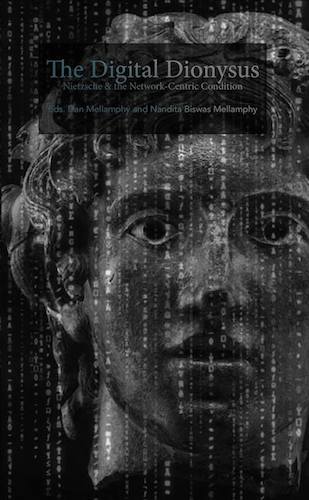
The Digital Dionysus: Nietzsche & the Network-Centric Condition
Edited by Dan Mellamphy and Nandita Biswas Mellamphy
FORTHCOMING: Autumn 2016
Can Nietzsche be considered a thinker of media and mediation, as the German media theorist Friedrich Kittler declared in his influential book Gramophone, Film, Typewriter?
Nietzsche was a truly transdisciplinary thinker, one who never fit into his own 19th – century surroundings and who recognized himself as a ‘herald and precursor’ of the future, of our globally-reticulated digital present. Perhaps not since Kittler has there been a study — let alone an anthology — that re-assesses and re-evaluates Nietzsche’s thought in light of the technically mediated and machinic conditions of the human in the age of digital networks.
Drawing on the first four years of conference-proceedings from the annual Nietzsche Workshop @ Western (NWW, Western University, Ontario), which culminated in the “New York NWW.IV”: Cyber-Nietzsche: Tunnels, Tightropes, Net-&-Meshworks (held at the Center for Transformative Media, Parsons The New School for Design), The Digital Dionysus explores Nietzschean themes in light of the problems and questions of digitization, information and technical mediation, offering its readers the opportunity to consider Nietzsche’s contemporary relevance in light of emerging theories in new media studies, political studies, critical aesthetics, the digital humanities and contemporary post-continental philosophy.
Co-edited by Dan Mellamphy and Nandita Biswas Mellamphy (Western University, Ontario + Center for Transformative Media, Parsons The New School for Design), the volume features essays and works by leading and emerging philosophers, artists, (h)activists, and political media theorists, including Babette Babich, Scott Bakker, Shannon Bell, Nandita Biswas Mellamphy, Jen Boyle, Sarah Choukah, Manav Guha, Perry Hall, Horst Hutter, Arthur Kroker, Pawel Krol, Nicola Masciandaro, Dan Mellamphy, Joseph Nechvatal, Dominic Pettman, Julian Reid, Gary Schapiro, Heike Schotten, Eugene Thacker and Dylan Wittkower.
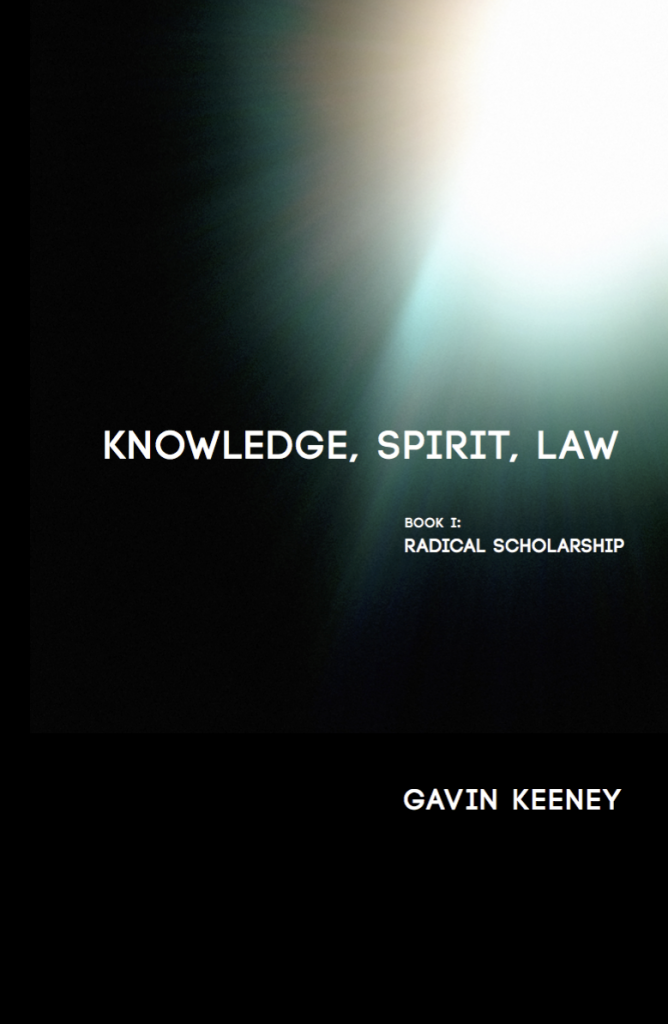
Knowledge, Spirit, Law
Gavin Keeney [2015]
A de facto phenomenology of scholarship in the age of neoliberal capitalism. The eleven essays (plus Appendices) cover topics and circle themes related to the problems and crises specific to neoliberal academia, while proposing creative paths around the various obstructions. The obstructions include metrics-obsessed academia, circular and incestuous peer review, digitalization of research as stalking horse for text- and data-mining, and violation by global corporate fiat of Intellectual Property and the Moral Rights of Authors. These issues, while addressed obliquely in the main text, definitively inform the various proscriptive aspects of the essays and, via the Introduction and Appendices, underscore the necessity of developing new-old means to no obvious end in the production of knowledge — that is to say, a return to forms of non-instrumentalized intellectual inquiry. To be developed in two concurrent volumes, Knowledge, Spirit, Law will serve as a “moving and/or shifting anthology” of new forms of expression in humanistic studies.
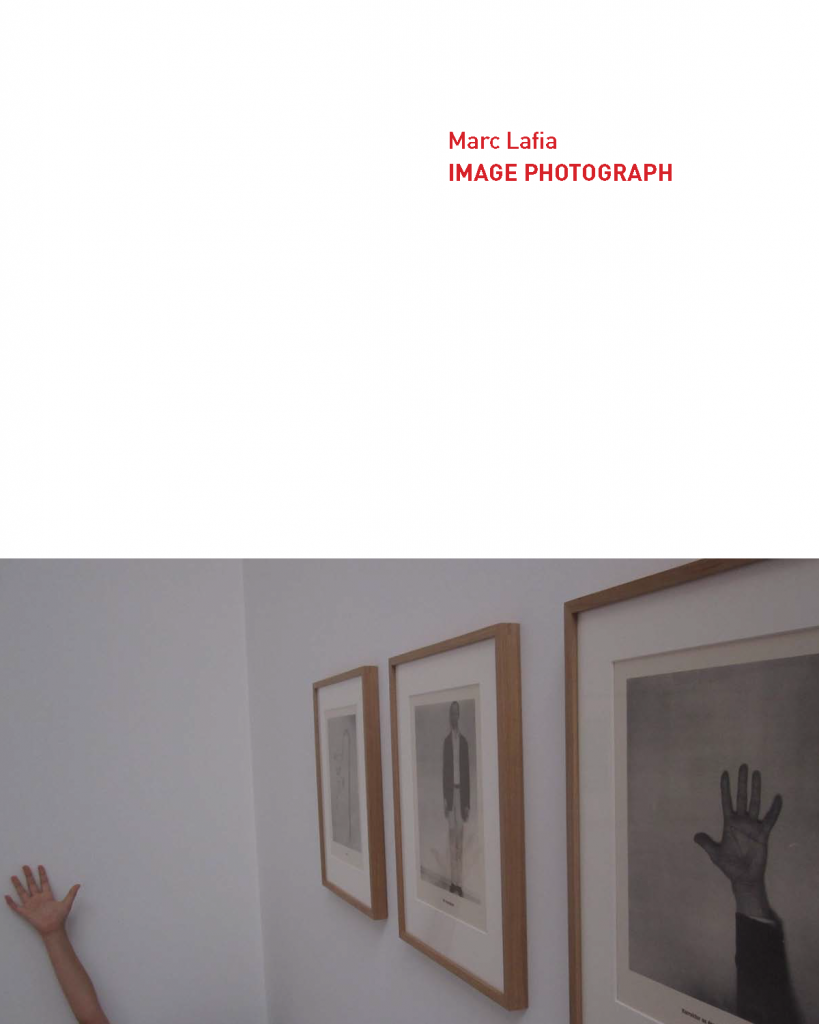
IMAGE PHOTOGRAPH
Marc Lafia [2015]
We no longer live in the society of the spectacle, passively seeing the world. Now we perform our very own spectacle in a society that demands it at every turn. We’ve become advertisements of ourselves, our own PR agents, continually putting on a performance and measuring it hour by hour. This is no longer the society of the spectacle but the society of performance. All events have become a pretense to create the image, to orchestrate an image of images that is us. We believe the image confers on us a kind of immortality: just as the artist believes her works collected by a major museum will do the same, we believe the network will forever host the archive we build everyday. The image that is us lives in the circulation of the network. Though a file, though virtual and malleable, made out of bits and instantly accessible to anyone who wants to find it around the world, this image that lives only lives on screen, as virtual as it might be, is a material fact. In its impression, its reception, its archivability, its remixability, the electronic image is today’s photograph.
Image Photograph is a book about, and of, this transformation of the image. In three essays — a foreword by critic and philosopher, Daniel Coffeen; an essay of images and text that explores the varied rhetorics of the image; and a strictly visual essay — the book presents a traversal through photography to arrive at a new understanding of images, what Lafia calls the image-photograph. As Coffeen states, ‘Lafia takes up the prescribed space of the photograph and, by touring the new conditions of imaging, remaps the very space of photography.’
Which is to say, Lafia presents and examines imaging across a breadth of moods, tropes, and contexts in order to see and engage this new technology of image-seeing and image-making — this image-photograph — as it exists today in our age of electronic inscription and networked culture.
At once artist book and critical theory, Image Photograph takes its direction from Walter Benjamin’s Arcades, John Berger’s Ways of Seeing and, more recently, Hito Steyerl’s The Wretched of the Screen. Throughout it, Lafia not only writes about the image but constructs images — and, finally, performs this new space of the image-photograph.
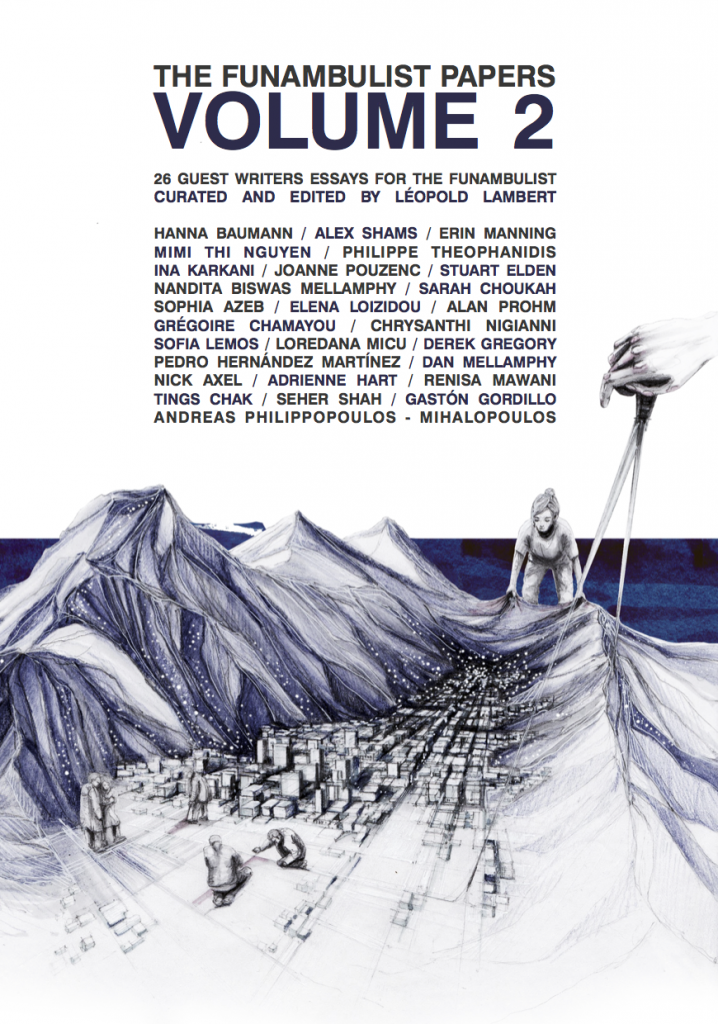
The Funambulist Papers, Volume 2 [2015]
Edited by Léopold Lambert
The second volume of texts curated specifically for The Funambulist since 2011. The editorial line of this second series of twenty-six essays is dedicated to philosophical and political questions about bodies. This choice is informed by Léopold Lambert’s own interest in the (often violent) relation between the designed environment and bodies. Corporeal politics do not exist in a void of objects, buildings and cities; on the contrary, they operate through the continuous material encounters between living and non-living bodies. Several texts proposed in this volume examine various forms of corporeal violence (racism, gender-based violence, etc.). This examination, however, can only exist in the integration of the designed environment’s conditioning of this violence. As Mimi Thi Nguyen argues in the conclusion of this book’s first chapter, “the process of attending to the body — unhooded, unveiled, unclothed — cannot be the solution to racism, because that body is always already an abstraction, an effect of law and its violence.” Although the readers won’t find indications about the disciplinary background of the contributors — the “witty” self-descriptions at the end of the book being preferred to academic resumés — the content of the texts will certainly attest to the broad imaginaries at work throughout this volume. Dialogues between dancers and geographers, between artists and biohackers, between architects and philosophers, and so forth, provide the richness of this volume through difference rather than similarity.
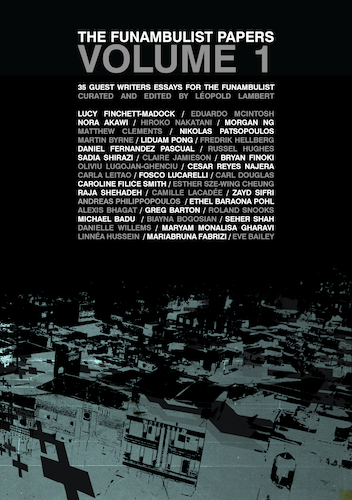
The Funambulist Papers, Volume 1 [2013]
Edited by Léopold Lambert
This book is a collection of thirty-five texts from the first series of guest writers’ essays, written specifically for The Funambulist weblog from June 2011 to November 2012. The idea of complementing Lambert’s own texts on his blog with those written by others originated from the idea that having friends communicate with each other about their work could help develop mutual interests and provide a platform to address an audience. Thirty-nine authors of twenty-three nationalities were given the opportunity to write essays about a part of their work that might fit with the blog’s editorial line. Overall, two ‘families’ of texts emerged, collected in two distinct parts in this volume. The first one, The Power of the Line, explores the legal, geographical and historical politics of various places of the world. The second, Architectural Narratives, approaches architecture in a mix of things that were once called philosophy, literature and art.
The Funambulist Pamphlets, Leopold Lambert [2013-15]
A series of twelve small books archiving articles published on The Funambulist, collected according to specific themes. These volumes propose a different articulation of texts than the usual chronological one. The twelve first volumes are respectively dedicated to Spinoza, Foucault, Deleuze, Legal Theory, Occupy Wall Street, Palestine, Cruel Designs, Arakawa + Madeline Gins, Science Fiction, Literature, Cinema, and Weaponized Architecture. As new articles are published on The Funambulist, more volumes will be published to continue the series.




